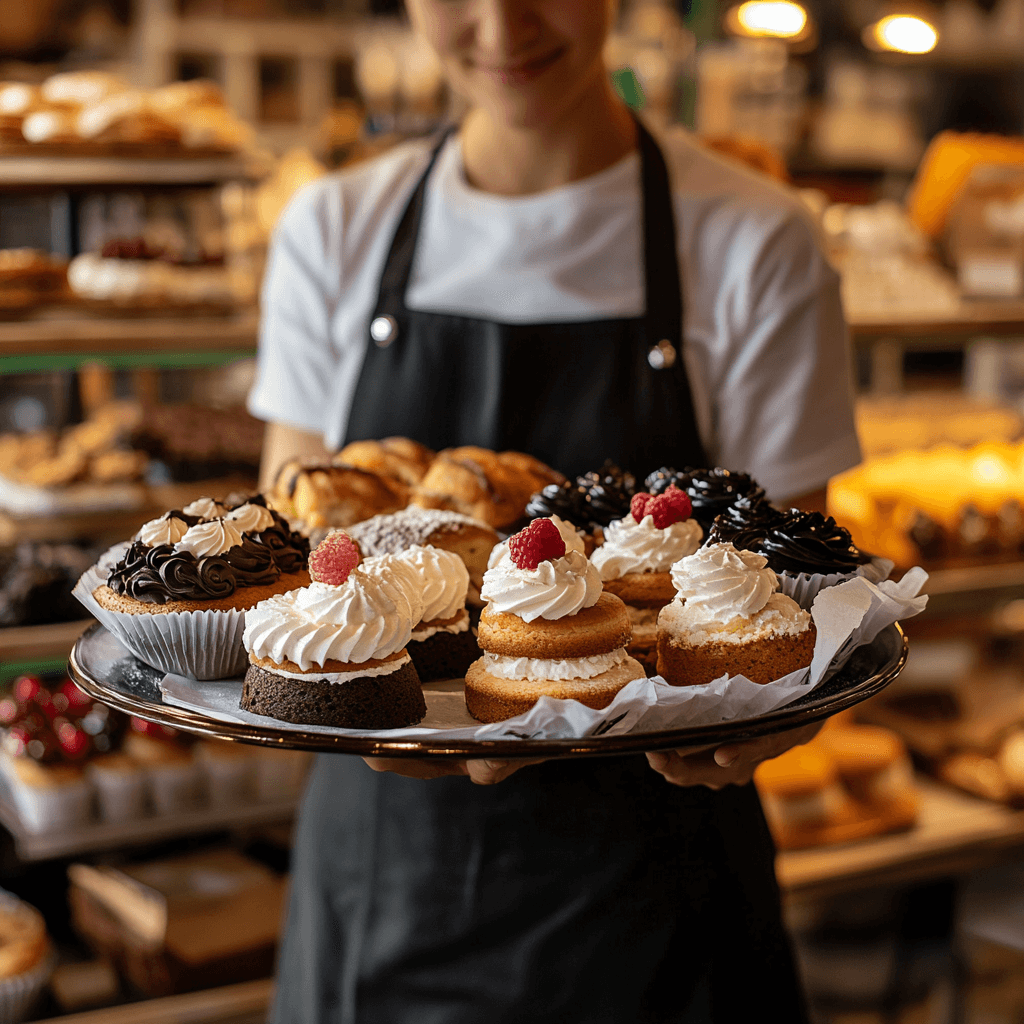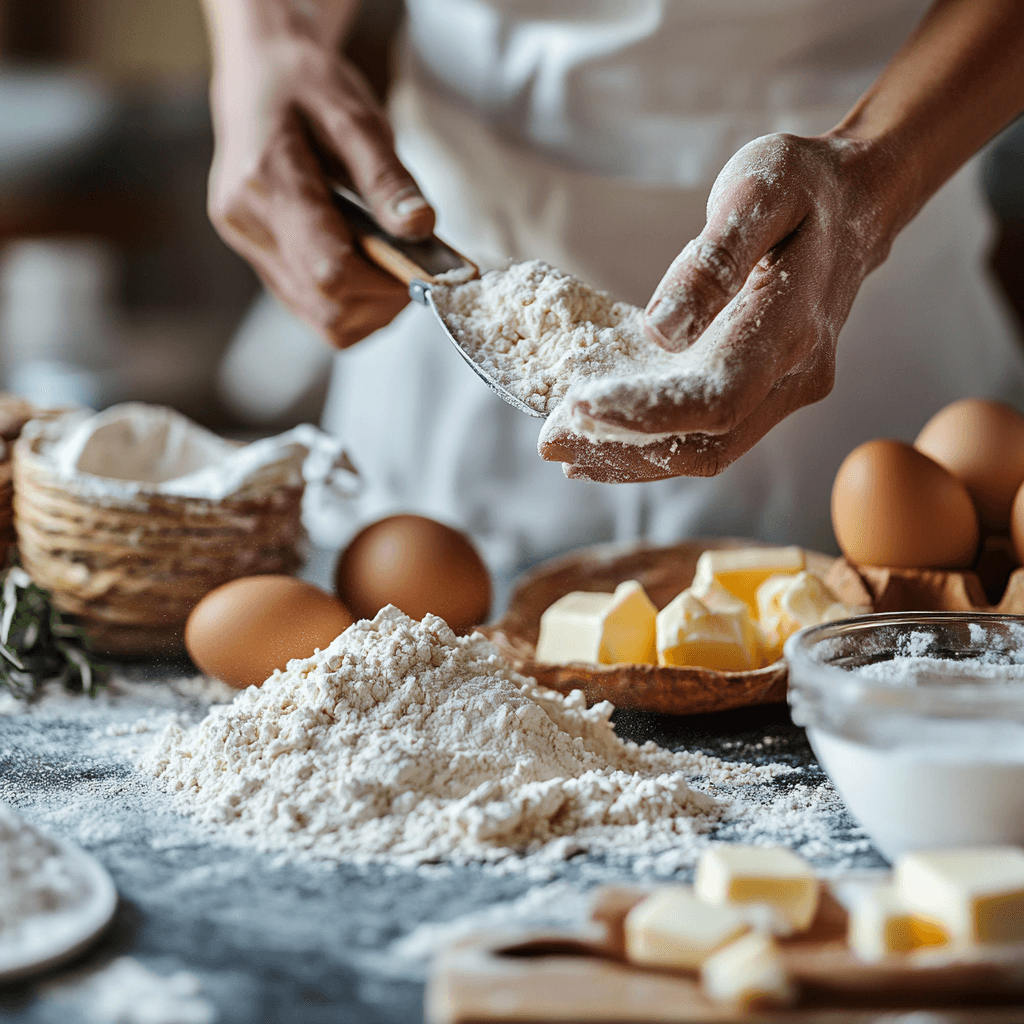
When you walk into a bakery, the tantalizing aroma of freshly baked cakes and pastries might lead you to wonder about the origins of these creations. Are the delectable cakes made from scratch, or do bakeries use boxed cake mixes? This question has sparked curiosity among dessert enthusiasts and home bakers alike. In this article, we’ll explore the baking practices of professional bakeries, the differences between boxed mixes and scratch baking, and how each method impacts the quality, flavor, and reputation of baked goods.
Table of Contents
What Is a Boxed Cake Mix?
Definition and Ingredients

A boxed cake mix is a pre-packaged blend of dry ingredients designed to simplify the baking process. Typically, it includes flour, sugar, leavening agents, and flavoring. Home bakers love boxed mixes for their convenience and consistent results.
Pros and Cons of Boxed Cake Mixes
Pros:
- Time-saving: Perfect for quick baking needs.
- Consistency: Yields predictable outcomes every time.
- Accessibility: Available in various flavors and styles.
Cons:
- Limited customization: Flavor and texture adjustments are restricted.
- Artificial additives: May include preservatives or synthetic flavoring.
- Perception: Seen as less “authentic” than scratch baking.
Do Professional Bakeries Use Boxed Cake Mixes?
Situations Where Boxed Mixes Might Be Used
Although scratch baking is often preferred in professional settings, there are scenarios where boxed mixes may be used:
- Large-scale production: For bakeries managing high-volume orders, boxed mixes can ensure uniformity.
- Time constraints: Small bakeries with limited staff might rely on mixes for specific items.
- Specialty needs: Some premium mixes cater to dietary restrictions, such as gluten-free or vegan cakes.
Reasons for Using Boxed Mixes
- Cost-effectiveness: Bulk mixes may reduce ingredient costs.
- Efficiency: Speeds up the baking process without compromising entirely on quality.
- Consistency: Ensures every batch looks and tastes the same, which is critical for branding.
The Benefits of Baking from Scratch

Quality and Customization
Baking from scratch allows bakeries to have complete control over the quality of their products. They can select premium ingredients, adjust recipes to suit their style, and cater to unique customer preferences. This level of customization is nearly impossible to achieve with boxed cake mixes. For instance:
- Flavor Adjustments: Bakers can experiment with flavors like lavender, chai, or yuzu that are not commonly found in pre-made mixes.
- Dietary Modifications: Recipes can be tailored to specific needs, such as sugar-free, keto-friendly, or allergen-free options.
- Ingredient Transparency: Customers are increasingly conscious of what goes into their food, and scratch baking allows bakers to provide a complete ingredient list without artificial additives or preservatives.
Enhancing Brand Reputation
Scratch baking is often seen as a testament to a bakery’s commitment to quality and craftsmanship. Bakeries that highlight their use of fresh, locally sourced ingredients often appeal to a more discerning clientele. This positioning not only elevates their brand but also enables them to charge premium prices for their cakes. Customers who are willing to pay more for scratch-baked items often view these purchases as indulgences or luxury experiences, further reinforcing the bakery’s upscale reputation.
Bakeries that prioritize scratch baking often market their products as “artisan” or “homemade,” which resonates with customers looking for authenticity. This approach boosts customer loyalty and justifies premium pricing. Many bakeries also use scratch baking as a way to stand out in competitive markets, emphasizing the “made with love” aspect of their craft.
Boxed Cake Mixes vs. Scratch Baking
Taste and Texture Differences
One of the most noticeable differences between boxed and scratch cakes is the texture. Boxed mixes are designed for mass appeal and often produce cakes with a uniformly soft texture that appeals to most palates. However, scratch cakes often have a more complex structure, offering a balance between moistness and firmness. This nuanced texture can elevate the eating experience, especially in layered or tiered cakes where the base must hold up under the weight of fillings and decorations.
The debate between boxed mixes and scratch baking often hinges on taste and texture. While boxed mixes are formulated for consistent results, they can lack the depth of flavor found in scratch-made cakes. Key differences include:
- Moisture Content: Boxed mixes often contain emulsifiers and stabilizers that produce a moist but uniform texture. Scratch cakes can have a more nuanced crumb structure.
- Flavor Complexity: Scratch baking allows for the development of subtle flavors through techniques like browning butter or using fresh fruit purees.
- Perceived Freshness: Scratch cakes have a distinct, fresh-baked aroma and taste that mixes struggle to replicate.
Nutritional Considerations
Boxed cake mixes frequently include processed ingredients such as hydrogenated oils, artificial colors, and high-fructose corn syrup. Scratch baking, on the other hand, provides the opportunity to use whole, unprocessed ingredients like organic sugar, pasture-raised eggs, and natural flavorings, appealing to health-conscious consumers.
The Hybrid Approach: Combining Methods
How Some Bakeries Blend Techniques
Some bakeries have found a middle ground by using boxed cake mixes as a base and enhancing them with fresh ingredients. Known as the “doctored mix” approach, this method combines convenience with creativity. Examples include:
- Adding fresh butter instead of oil for a richer taste.
- Incorporating milk, yogurt, or buttermilk for added moisture.
- Mixing in fresh fruit, nuts, or spices for unique flavor profiles.
Benefits of the Hybrid Method
For bakeries juggling a wide range of orders, combining boxed mixes with fresh ingredients provides the dual benefits of consistency and creativity. A bakery could use a chocolate boxed mix as a foundation while incorporating premium ingredients like espresso or orange zest to create a luxurious mocha-orange cake. This approach allows them to scale production for high-volume orders while still delivering unique flavors that keep customers coming back.
This approach offers the best of both worlds: the reliability of a boxed mix and the personalized touch of scratch baking. It’s particularly useful for bakeries juggling large-scale production with a desire to maintain quality. Additionally, customers might not notice—or even care—if the end product tastes great and meets their expectations.
Insights from Professional Bakers
Perspectives on Boxed Cake Mixes
Many professional bakers have shared their thoughts on the use of boxed cake mixes in the industry. While opinions vary, most agree that the choice depends on the bakery’s goals, clientele, and the specific type of product being created. Key insights include:
- Artisanal Bakers: They often view scratch baking as a hallmark of craftsmanship, rejecting the use of boxed mixes entirely to preserve their brand identity.
- Commercial Bakers: For large-scale operations, boxed mixes can provide a reliable foundation for creating consistent products quickly.
- Specialty Bakers: Some use boxed mixes tailored for niche markets, like gluten-free or vegan options, to streamline production while meeting dietary demands.
Balancing Quality and Efficiency
Many professional bakers emphasize that the decision to use boxed cake mixes is not a reflection of skill but a strategic choice. For smaller bakeries, time and resource constraints may make boxed mixes a practical option. However, these mixes are rarely used in their original form. Instead, professional bakers often modify them with high-quality ingredients like real vanilla extract, heavy cream, or fresh fruit purees, elevating the final product while keeping efficiency in check. This combination of practicality and creativity ensures that the finished cakes meet customer expectations for flavor and presentation.
Bakers in high-demand environments face the challenge of delivering top-tier products while managing time and costs. Some confess to using boxed mixes for certain items, such as sheet cakes or bulk orders, while reserving scratch baking for high-profile or custom cakes. This balance ensures that their bakery remains efficient without compromising entirely on quality.
Consumer Perception
What Customers Expect
Consumer expectations play a critical role in a bakery’s decision to use boxed cake mixes. Customers often expect:
- Authenticity: Many assume bakery cakes are made from scratch, associating this process with higher quality and care.
- Transparency: Modern consumers value honesty in food labeling and preparation methods. A bakery’s reputation can suffer if customers discover widespread use of boxed mixes.
- Value for Money: Customers paying premium prices for cakes expect a corresponding level of craftsmanship and uniqueness that boxed mixes may not deliver.
Managing Perception
Transparency is key when managing customer perceptions about boxed mix usage. Some bakeries opt to highlight the fresh ingredients they incorporate into pre-made bases rather than focusing on the mix itself. For instance, marketing a cake as “freshly baked with real buttercream frosting and locally sourced berries” can shift the focus to quality components, ensuring customers feel they are getting premium products without the need to disclose every baking shortcut.
Some bakeries openly disclose their use of premium cake mixes, framing it as a strategic choice for consistency and reliability. Others avoid the topic altogether, focusing instead on marketing the freshness and artistry of their decorations and presentations. Ultimately, perception management depends on how well a bakery aligns its methods with customer expectations.
Cost and Efficiency in Bakeries
The Financial Advantages of Boxed Mixes
In high-volume operations, where hundreds of cakes are baked daily, the predictability of boxed mixes can save time and money. When a bakery produces identical cakes for events such as weddings or corporate functions, consistency becomes a top priority. Boxed mixes help maintain uniformity across batches, reducing the likelihood of waste or reworks. This level of efficiency translates to lower operational costs, which can help bakeries stay competitive while keeping prices accessible for their customers.
Boxed cake mixes can be a cost-effective solution for bakeries, particularly when purchasing in bulk. Financial benefits include:
- Reduced Labor Costs: Preparing cakes from mixes requires less skilled labor, allowing bakeries to save on staffing expenses.
- Consistent Supply: Boxed mixes ensure that bakers always have access to the same quality ingredients, reducing waste from failed batches.
- Economies of Scale: Large bakeries can negotiate discounts for bulk orders, further lowering costs.
Balancing Savings with Quality
While boxed mixes offer efficiency, scratch baking often justifies higher pricing due to perceived quality. Some bakeries use the savings from boxed mixes to invest in other areas, such as premium decorations, packaging, or customer service, creating a well-rounded product experience.
Innovations in Cake Mixes
Premium Boxed Cake Mixes for Professionals
The baking industry has seen advancements in boxed cake mixes, with premium options now available that cater to professional bakers. These high-end mixes often include:
- Natural Ingredients: Free from artificial additives and preservatives, appealing to health-conscious consumers.
- Specialty Flavors: Options like matcha, salted caramel, and red velvet with high-quality cocoa and flavoring.
- Dietary Flexibility: Gluten-free, vegan, and organic mixes designed for specific dietary needs.
These innovations bridge the gap between the simplicity of boxed mixes and the quality demanded by professionals, allowing bakeries to maintain efficiency while meeting customer expectations.
Customizable Mixes
Modern cake mix manufacturers are catering to professional bakers by offering customizable options. These mixes come with baseline ingredients but leave room for bakers to add their personal touch. For instance, a baker could use a neutral vanilla mix and infuse it with cardamom, lemon zest, or elderflower syrup to create signature flavors. This approach strikes a balance between convenience and uniqueness, giving bakers the ability to differentiate their offerings while minimizing the labor-intensive process of measuring every ingredient from scratch.
Manufacturers now offer semi-customizable cake mixes, where bakers can adjust key ingredients to create unique textures and flavors. Examples include adding more leavening agents for a fluffier texture or incorporating additional stabilizers for layered wedding cakes. This hybrid approach gives bakers creative freedom while retaining the convenience of pre-packaged mixes.
Sustainability and Ethical Considerations
Environmental Impact of Baking Methods
The environmental footprint of scratch baking versus boxed mixes depends on several factors:
- Scratch Baking: Often involves sourcing fresh, local ingredients, which reduces transport emissions and supports sustainable farming practices. However, it can generate more waste due to failed batches or unused raw materials.
- Boxed Mixes: Typically produced at scale, these mixes may rely on industrial farming and long-distance shipping, increasing their carbon footprint. However, they minimize waste through standardized portions and shelf stability.
Choosing Sustainable Options
Bakeries looking to minimize their environmental impact can:
- Opt for organic, non-GMO boxed mixes.
- Source scratch ingredients locally and seasonally.
- Reduce packaging waste by buying in bulk or supporting eco-friendly suppliers.
By aligning their baking practices with sustainability goals, bakeries can appeal to eco-conscious customers while reducing their overall environmental impact.
FAQs About Boxed cake
Do most bakeries use boxed cake mixes?
No, most artisan bakeries and high-end establishments prefer scratch baking to maintain quality and originality. However, some commercial and chain bakeries use boxed mixes for efficiency and consistency.
Can you tell if a bakery cake was made with a mix?
While boxed mix cakes often have a uniform texture and flavor, it can be difficult to tell if a bakery enhances the mix with fresh ingredients. Professional bakers can skillfully modify mixes to match scratch-made cakes.
Are boxed cake mixes unhealthy?
Not inherently, but many boxed mixes contain artificial additives, hydrogenated oils, and high levels of sugar. Opting for premium mixes or scratch baking allows better control over ingredients.
Why do some bakeries prefer boxed mixes?
Boxed mixes offer convenience, consistency, and cost savings, which can be beneficial for bakeries managing large orders or limited resources.
Can customers request scratch-baked cakes at bakeries?
Yes, many bakeries offer custom scratch-baked options upon request, often at a higher price to account for labor and ingredient costs.
How do boxed mixes compare to scratch baking in flavor?
Scratch baking typically results in deeper, more complex flavors, while boxed mixes offer a consistent but often simpler taste. The difference is more noticeable to discerning palates.
Conclusion
The question of whether bakeries use boxed cake mixes does not have a one-size-fits-all answer. While artisanal bakeries tend to rely on scratch baking to emphasize quality and originality, commercial bakeries may use boxed mixes to streamline operations and meet large-scale demands. Both methods have their advantages and challenges, and many bakeries adopt a hybrid approach to balance efficiency with quality.
Ultimately, whether a bakery uses boxed mixes or scratch baking depends on its goals, customer expectations, and market niche. As innovations in cake mixes continue to blur the lines, customers can look forward to enjoying delicious cakes regardless of the method used. Understanding the processes behind the treats we love deepens our appreciation for the artistry and effort that goes into every slice.
